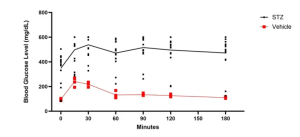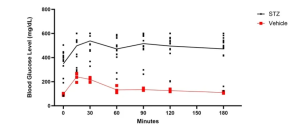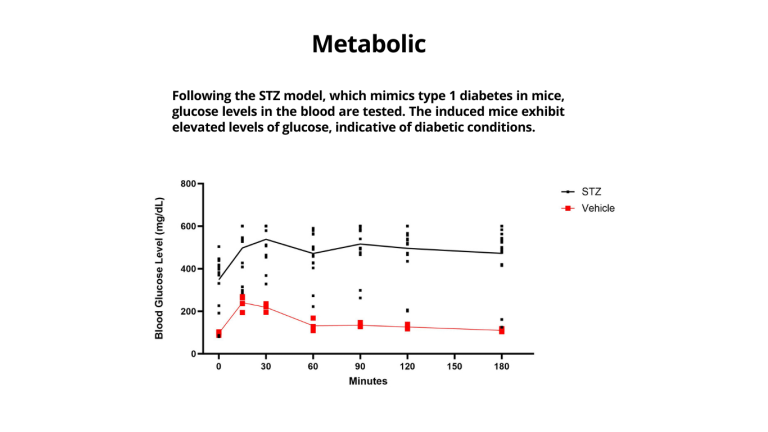Preclinical metabolic models in rodents play a crucial role in advancing biomedical research, particularly in the field of gene therapy. These models allow the study of metabolic disease pathophysiology and potential therapeutic interventions, as well as the effects of diet, exercise, and medications on metabolic health.
Vivox specializes in developing metabolic models, including genetically modified mice and diet-induced obesity models. We offer an array of services including metabolic phenotyping, glucose tolerance tests and lipid profiling, providing comprehensive insights into metabolic health.
The following models for drug candidates and metabolic research are available at Vivox:
At Vivox, our unique approach to studying inflammation and immunology incorporates scientific expertise, advanced surgical techniques, and meticulous research protocols that adhere to GLP standards.
The following models for drug candidates and immunological research are available at Vivox:
Our services support a variety of therapeutic areas

Microbiome

Cell & Gene based Therapy

Biological therapy

Cannabis based therapy

Pharmaceuticals

Nutraceuticals

Medical devices
Metabolic Models
Obesity Models
High-fat diet (HFD) mice models are commonly used in preclinical research to study the effects of a diet high in fat content on various physiological processes and disease conditions. In these models, mice are fed a diet that contains a significantly higher proportion of fat compared to a standard rodent diet.
HFD compositions may vary, but typically consist of around 45-60% of calories from fat, while a standard diet usually contains around 10-20% of calories from fat. This higher fat content in the diet leads to increased caloric intake and the development of obesity, insulin resistance, dyslipidemia, and other metabolic abnormalities over time, mimicking certain aspects of metabolic syndrome and related disorders in humans.
Vivox uses HFD mice models to investigate the underlying mechanisms of obesity-related diseases, test potential therapeutic interventions, and explore the impact of diet on various physiological processes. These models provide valuable insights into the role of diet in health and disease and are instrumental in the development of new treatments and preventive strategies.
DB/DB and NOD mice
Vivox specializes in utilizing DB/DB and NOD mice in preclinical research to advance the understanding of diabetes and associated autoimmune diseases.
DB/DB Mice:
- Vivox employs DB/DB mice to study type II diabetes mellitus (T2DM) and related metabolic disorders. Our research focuses on investigating the underlying mechanisms of insulin resistance, hyperglycemia, obesity, and associated complications.
- We utilize DB/DB mice to evaluate the efficacy of potential therapeutics targeting T2DM, including insulin sensitizers, anti-diabetic drugs, and interventions to mitigate metabolic abnormalities.
NOD Mice:
- Vivox leverages the NOD mice model to investigate autoimmune diseases, particularly type I diabetes mellitus (T1DM). Our research aims to understand the autoimmune mechanisms leading to beta cell destruction and insulin deficiency in T1DM.
- Vivox uses NOD mice to explore immunomodulatory therapies, tolerance induction strategies, and interventions to preserve beta cell function and prevent T1DM progression.


Streptozotocin (STZ) T1DM Model
The STZ (streptozotocin) model is commonly used in diabetes research to mimic type 1 diabetes in animals by destroying pancreatic beta cells. Vivox specializes in using the STZ model for preclinical studies, evaluating diabetes-related parameters and testing potential treatments.

Glucose tolerance tests
A glucose tolerance test (GTT) assesses how the body processes sugar. It involves fasting, consuming a glucose solution, and measuring blood glucose levels at intervals to evaluate glucose metabolism. Vivox conducts GTT in preclinical research to assess insulin sensitivity and diabetes-related parameters in animal models.

Insulin tolerance tests
The insulin tolerance test (ITT) is a procedure used to assess the body’s sevsitivity and response to insulin. It involves administering a dose of insulin to induce hypoglycemia, followed by measuring blood glucose levels over time to evaluate the body’s ability to regulate glucose metabolism. This test is often used to diagnose disorders related to insulin production or sensitivity, such as diabetes or hypopituitarism.
Vivox specializes in utilizing ITT in preclinical studies to evaluate insulin sensitivity and study metabolic disorders like diabetes and obesity.
Mixed Meal Tolerance Test (MMTT)
The mixed meal tolerance test (MMTT) is a pivotal tool in understanding insulin sensitivity and glucose metabolism, particularly in individuals with diabetes or metabolic disorders. By administering a standardized mixed meal and monitoring blood glucose and insulin levels over time, the MMTT provides crucial insights into postprandial glucose control and pancreatic beta-cell function.
At Vivox, preclinical research using the MMTT model is instrumental in studying metabolic disorders and evaluating the effectiveness of potential therapeutic interventions. Our expertise in the MMTT model allows us to delve deep into metabolic pathways, insulin resistance mechanisms, and the development of targeted treatments for metabolic diseases.
Oral Lipid Tolerance Test (OLTT)
The oral lipid tolerance test (OLTT) plays a crucial role in assessing how the body processes fats after a high-fat meal, providing valuable insights into lipid metabolism and postprandial lipemia.
Vivox’s preclinical research using the OLTT model is employed to study lipid-related disorders and to evaluate the efficacy of interventions targeting lipid metabolism. By utilizing animal models to replicate human lipid responses, such as rodents, we can investigate mechanisms underlying dyslipidemia and cardiovascular disease risk factors. Vivox’s expertise in the OLTT model contributes to developing targeted strategies for managing lipid-related health conditions and advancing our understanding of lipid metabolism.
Insulin/glucose clamps – hyperglycemic and euglycemic-hyperinsulinemic
Insulin/glucose clamps are a widely used technique in preclinical research in mice models to assess insulin sensitivity and glucose metabolism. In this procedure, insulin and glucose levels are controlled to maintain a constant blood glucose concentration, allowing researchers to precisely measure the body’s response to insulin. This involves infusing insulin to suppress endogenous glucose production while simultaneously infusing glucose to maintain stable blood glucose levels. By adjusting the infusion rates of insulin and glucose, researchers can determine insulin sensitivity and assess factors influencing glucose metabolism in mice, providing valuable insights into metabolic disorders such as diabetes and obesity.
Vivox integrates insulin/glucose clamp studies into our preclinical investigations to evaluate potential therapeutic effects of novel compounds or interventions on insulin activity, glucose homeostasis, and metabolic disorders like diabetes. These studies provide valuable insights into metabolic regulation and potential therapeutic strategies for metabolic diseases.
Biomarker assessment to support proof of activity/mechanism (multi-analyte detection)
Biomarker assessment is a critical aspect of evaluating proof of activity and mechanism in preclinical research, especially when using multi-analyte detection methods. By analyzing multiple biomarkers simultaneously, such as cytokines, growth factors, and signaling molecules, researchers can gain comprehensive insights into the biological processes underlying a drug’s efficacy or mechanism of action.
Vivox specializes in advanced biomarker assessment techniques, utilizing state-of-the-art technologies like multiplex assays and high-throughput screening platforms to measure and quantify various biomarkers in biological samples. This enables us to elucidate complex molecular pathways, validate therapeutic targets, and demonstrate the efficacy of novel interventions across a range of therapeutic areas. Vivox’s expertise in biomarker assessment supports robust proof-of-concept studies and accelerates the development of effective treatments for diverse medical conditions.
Research outcomes - examples

